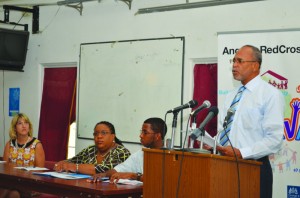
A crime and violence prevention initiative, under the theme “Building a Safer Community”, was launched by the Anguilla Red Cross on Monday, November 12, at the Teachers’ Resource Centre. The Safer Community Programme is funded by the Governor’s Office and supported by the Canadian Red Cross.
Chairperson of the Anguilla Red Cross, Susan Hodge, said that violence had permeated the core of the island’s society. “Our once peaceful haven has been plagued of late by violent incidences [such as] shootings, senseless deaths and maiming,” she lamented.“Our youth, the future of our island, are being bombarded by violence. Anguilla is not alone in this epidemic of violence, as many countries are also being impacted.”

Ms Hodge was pleased that the Anguilla Red Cross had developed and implemented a ten-step programme to stem violence on the island. Those steps are as follows: understand the issue; recognise the vulnerability and resiliency of children and youth; define protection instruments; team-building; complete a risk assessment; develop policies and procedures; educate adults, youth and children; respond to disclosures of violence, abuse , bullying and harassment; meet challenges; and maintain safe environments.
Programme Manager, Youth & Peer Education, Jiva Niles, disclosed that the Anguilla Red Cross was planning to conduct a number of peer education workshops with persons between 10 and 30 years. The training will include the above ten steps against crime and violence. There will also be panel discussions and other interactive approaches. The programme will span a five-month period, ending in March 2013. A Canadian Red Cross official is to visit Anguilla later as part of the programme.

Ms Niles said that the planning committee was optimistic about the success of the project and hoped that all stakeholders would work together to achieve the desired end results.
Mrs Kim Cutler, who spoke on behalf of the Governor’s Office, commended the Anguilla Red Cross for its initiative and expressed the hope that much would be achieved to prevent crime and violence on the island. She was pleased that the Governor’s Office had undertaken to fund the programme.
Minister of Social Development, Edison Baird, said the Government’s concern about crime and violence stemmed from several considerations. He related them as being the safety and well being of citizens; increased cost to the public health system; the justice system; the effects on the tourism industry and thus the economy; and the spin-off effects of diverting resources away from other areas to meet the associated costs.
“For us, as citizens, we simply want to be safe,” the Minister continued. “We don’t want to worry about where to live, where to go or what time to go home from work. We also want our taxpayers’ money to be used for wholesome things that benefit all of us and bring progress to Anguilla. This includes improving school environments, better health-care facilities, modern sporting facilities and better infrastructure – not for paying the bill for criminal activity.”
Mr. Baird applauded the Anguilla Red Cross and in particular the Youth and Peer Education Committee on its initiative. “It demonstrates your concern for the problem and your willingness to be a part of the solution and to engage others in formulating a community response,” he added.

The keynote address was delivered by Ms Olufunmike Banks-Devonish, who recently returned to Anguilla from Canada with a Bachelor’s Degree in Psychology. “There is no doubt that youth involvement in gangs and other criminal activities is approaching alarming proportions in Anguilla and the Caribbean as a whole,” she stated. “The prevention of this situation, therefore, requires community partnerships in suppression, prevention and intervention strategies. Indeed, a multi-stakeholder approach is one of the best ways of taking back our youth from the destructive elements of gang involvement. Saving our youth and building a safer community is everybody’s business.”
Ms Banks examined such matters as why there is a need to stem the tide of gang culture; theories from a sociological perspective; functions of institutions that can help to prevent youth involvement in gang culture and other deviant behaviour; marriage and the family; the influence of religion; the value of education; the role of the mass media in the island as it relates to youth and community matters; leadership peer groups; and the roles of the family, community and school.
“The time is now for action to be taken, and the various institutions should seek to work together in a collaborative fashion, as well as in their particular spheres of influence, to prevent our young people from either entering or continuing in gangs and other criminal activities,” Ms Banks concluded. “If we succeed then this would certainly be a significant contribution towards the development of society. If we fail, then we’ll all be consumed.”
The Anguilla Red Cross Coordinator, Ricky Rouphine, who brought the launching ceremony to an end, spoke about a number of activities which would follow later on as part of the “Building a Safer Community Programme.”








